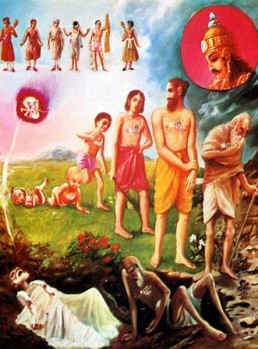Swami Chinmayananda Commentary
This Eternal, All-Pervading Self is certainly Unmanifest, Unthinkable, and Unchangeable, and therefore, having known this truth in Its essential nature, Krishna argues that it is neither possible to kill nor to get really killed. Each of these terms is quite expressive of certain logical truths.
UNMANIFEST — The five Great Elements that we know, when they become subtler, they lose their capacity to impinge themselves upon our sense perceptions: considered from ‘Earth’ to ‘Air,’ we find the elements progressively getting subtler for our perceptions and finally ‘Ether’ or ‘Space,’ by itself, cannot be perceived directly by our senses at all. However, the five Great Elements can, to some extent, be perceived through our sense-organs. But the CAUSE of ‘Ether, ‘ the subtlest of the Five Elements, is too subtle for our perception, and therefore we will have to assume that it is Unmanifest.
A thing is called manifest when we can perceive it through one or the other of our sense-organs. That which is beyond all five sense-organs is called Unmanifest. I cannot see, smell, hear, taste or touch a full-grown mango tree in a mango seed, and yet, I know that the seed is the cause for the tree. Under the circumstances, the tree is said to be in an ‘unmanifest’ condition in the seed. Similarly, when they say that truth is Unmanifest, they only mean that It cannot be perceived through any of our sense-organs. In the Upanishads, we have exhaustive explanations of why our senses cannot have the Eternal as an object of sense-perceptions. It is the very subject because of which the sense-organs can perceive.
UNTHINKABLE — After denying the sense-organs any play in the field of Truth, we are told that the human mind also cannot think, nor can the human intellect ruminate over and comprehend the Infinite. The Self being the very life that energises the mind and the intellect, which by themselves are inert and insentient, it becomes obvious that the mind and intellect cannot make the Self an object of their comprehension. A telescope-gazer cannot see himself with his telescope; he cannot be at once the seer and the seen. Thus here, the Lord’s word “Unthinkable” is to be understood as meaning ‘Incomprehensible’ by the mind and the intellect of the seeker.
UNCHANGEABLE — This term indicates that the Self is without parts because things that have parts in themselves are things which have “form,” and those that have “form” must necessarily come under the category of the FINITE and exhibit in themselves various modifications and changes.
By these terms, Truth is declared as Immutable, Unmanifest, Unthinkable and Unchangeable.
Krishna thus advises Arjuna to end his grief. He who understands the Eternal nature of the Self can have neither the occasion to perceive himself as the slayer nor recognise others as the slain.
GRANTING THAT THE SELF IS NOT EVER-LASTING, THE LORD PROCEEDS TO GIVE THE MATERIALISTS’ POINT-OF-VIEW:
Adi Sankara Commentary
Moreover, ucyate, it is said that; ayam, This, the Self; is avyaktah, unmanifest, since, being beyond the ken of all the organs, It cannot be objectified. For this very reason, ayam, This; is acintyah, inconceivable. For anything that comes within the purview of the organs becomes the object of thought. But this Self is inconceivable becuase It is not an object of the organs. Hence, indeed, It is avikaryah, unchangeable. This Self does not change as milk does when mixed with curd, a curdling medium, etc. And It is chnageless owing to partlessness, for it is not seen that any non-composite thing is changeful. Not being subject to transformation, It is said to be changeless. Tasmat, therefore; vidivata, having known; enam, this one, the Self; evam, thus, as described; na arhasi, you ought not; anusocitum, to grieve, thinking, ‘I am the slayer of these; these are killed by me.’
The Bhagavad Gita with the commentary of Sri Sankaracharya – Translated by Alladi Mahadeva Sastry
Holy Geeta – Commentary by Swami Chinmayananda
The Bhagavad Gita by Eknath Easwaran – Best selling translation of the Bhagavad Gita
The Bhagavad Gita – Translation and Commentary by Swami Sivananda
Bhagavad Gita – Translation and Commentary by Bhaktivedanta Swami Prabupadha
Srimad Bhagavad Gita Chapter 2 – Verse 25 – 2.25 avyakto ‘yam – All Bhagavad Gita (Geeta) Verses in Sanskrit, English, Transliteration, Word Meaning, Translation, Audio, Shankara Bhashya, Adi Sankaracharya Commentary and Links to Videos by Swami Chinmayananda and others – 2-25

